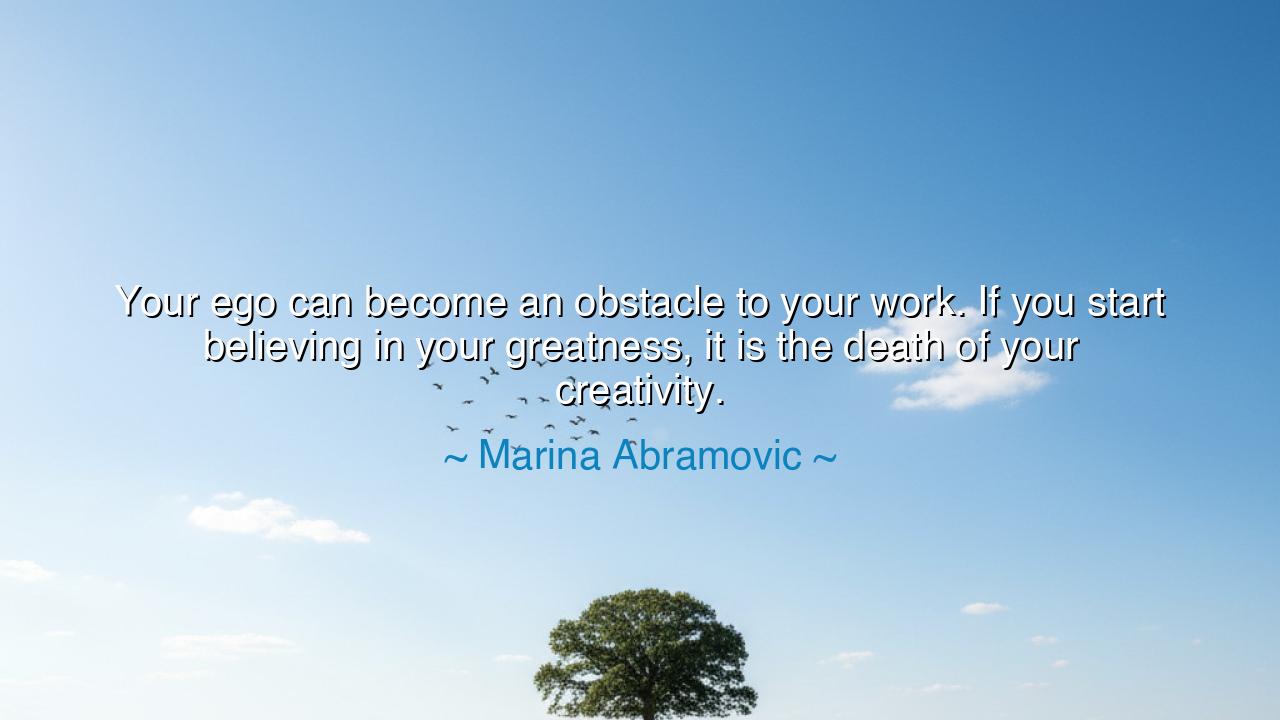
Your ego can become an obstacle to your work. If you start
Your ego can become an obstacle to your work. If you start believing in your greatness, it is the death of your creativity.






“Your ego can become an obstacle to your work. If you start believing in your greatness, it is the death of your creativity.” Thus spoke Marina Abramović, the high priestess of performance art, whose life has been a meditation on endurance, vulnerability, and the breaking of boundaries. In this profound saying, she reveals a truth as ancient as creation itself: that the ego—the self that hungers for praise and fears humiliation—is both the child and the destroyer of art. Abramović warns that when the creator begins to worship their own reflection, the sacred flame of creativity flickers and dies. For the moment you believe yourself great, you cease to reach for greatness.
To understand these words, we must understand the woman who spoke them. Marina Abramović’s art has always been a test of body and spirit—she has sat motionless for hours, invited strangers to harm her, and confronted pain, silence, and stillness as paths to truth. Through her, art became not mere display but ritual, a stripping away of illusion. And so she speaks not as a philosopher in comfort, but as one who has stood on the edge of exhaustion and fear, face to face with herself. She knows that ego, the constant whisper of self-importance, is the shadow that haunts every artist. It seduces with the false belief that one has arrived, that one is special, chosen, untouchable. But once the ego sits upon the throne, the muse flees.
For the ego craves comfort, while creativity thrives in risk. Ego wants to be admired; creativity wants to be transformed. Ego seeks recognition; creativity seeks revelation. The artist—or indeed, any creator—must dwell in a space of humility, where each act feels like the first, where the mind is open, uncertain, hungry. When one begins to believe that they are already great, they no longer explore—they repeat, they imitate themselves, they become their own imitation. Abramović’s warning is therefore not only to artists, but to all who seek mastery: never believe the myth of your own perfection, for that is the beginning of stagnation.
History offers countless examples of this truth. Consider the life of Michelangelo Buonarroti, whose genius shaped stone into soul. Despite his mastery, he saw every work as unfinished, every sculpture as a fragment of something greater. When praised, he replied, “Ancora imparo”—I am still learning. It was this humility, this refusal to be satisfied, that kept his spirit alive even into old age. Contrast this with others who, intoxicated by fame, became prisoners of their own image, repeating formulas that once brought success but now yielded emptiness. As Abramović tells us, the artist who believes they have “arrived” has already begun to die within.
In the ancient world, even the Greeks, who exalted heroes and celebrated genius, understood the danger of pride. They called it hubris, the arrogance that defies the gods and invites downfall. For every Odysseus who learned humility through suffering, there was an Icarus who flew too close to the sun, believing himself immortal. Abramović’s words are a modern echo of that eternal law: when one’s ego outgrows their reverence for truth, collapse follows. Creativity is not born of pride but of surrender—of being willing to fall, to fail, to become nothing so that something new may emerge.
Yet let us not misunderstand her. Abramović does not call for self-hatred or false modesty, but for awareness. The ego is not an enemy to be destroyed, but a servant to be mastered. One must use it to begin, but never let it lead. A true creator walks a narrow bridge—strong enough to believe in their vision, humble enough to know it is never complete. In her performances, Abramović demonstrates this balance: she gives herself wholly to the moment, dissolving the self so that the act becomes pure experience. In that surrender, she becomes both artist and art, channel and vessel.
So, O seeker of purpose, learn this wisdom: beware the comfort of greatness. When others praise you, listen with gratitude, but do not linger there. Return to your work, return to the unknown. Keep learning, failing, daring, questioning. For the moment you believe you have mastered your craft, the spirit of growth departs. The ego may promise glory, but it cannot create—it can only consume. The humble heart, open to wonder and uncertainty, is the true source of all creation.
Therefore, let your art—your work, your life—remain an act of discovery, not display. Seek not to be admired, but to awaken. Let your hands remain restless, your heart unentitled. For as Marina Abramović teaches, creativity lives in the emptiness left when the ego is silent. Protect that silence fiercely, for within it, the divine speaks—and the work is reborn again and again, as fresh as the first breath of creation.






AAdministratorAdministrator
Welcome, honored guests. Please leave a comment, we will respond soon